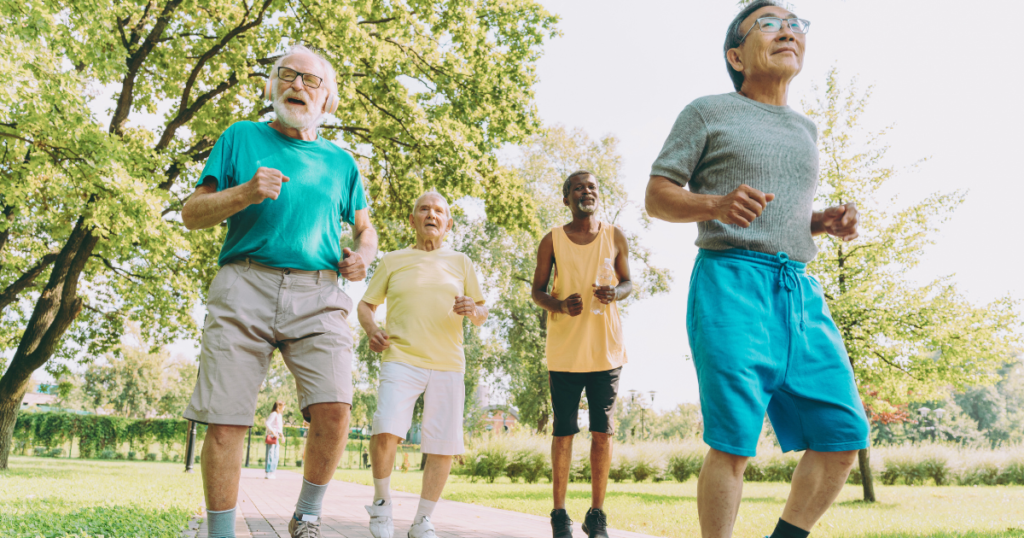
Maintaining mental health becomes just as important as physical well-being as we age. For many seniors, emotional struggles such as depression, anxiety, and loneliness are often overlooked in the broader discussion about aging. These challenges can stem from a loss of independence, physical health issues, and social isolation, all of which can have a profound impact on quality of life. In this article, we explore the complex relationship between aging and mental health, offering valuable insights and practical strategies to support emotional well-being in later life. We also discuss how innovative technology can play a role in alleviating stress and promoting relaxation, including one popular Amazon product that can help: Bose QuietComfort 35 II Wireless Bluetooth Headphones. By understanding and addressing these issues, seniors and their loved ones can work together to foster a more supportive, fulfilling, and joyful aging experience.
Understanding the Emotional Challenges of Aging
Aging brings with it a host of physical changes and life transitions that can lead to significant emotional challenges. For many seniors, the interplay between declining physical health and emotional well-being creates a difficult environment in which to thrive. It is crucial to recognize that mental health struggles in later life are not inevitable but can be mitigated with the right strategies and support.
Physical Changes and Their Emotional Impact
As the body ages, it undergoes a natural decline in strength, flexibility, and overall vitality. These physical changes can contribute to feelings of frustration, loss of control, and diminished self-esteem. Chronic conditions such as arthritis, heart disease, and diabetes not only affect physical capabilities but also weigh heavily on the mind. The pain, fatigue, and limitations imposed by these conditions can lead to increased stress and anxiety, making it harder for seniors to maintain a positive outlook on life.
Social Isolation and Loneliness
Social isolation is another significant factor that contributes to mental health challenges in seniors. Many older adults find themselves increasingly isolated as friends and family members move away or pass on. Retirement, while offering freedom from the structured work environment, can also lead to a loss of social interaction and purpose. Loneliness and the absence of a robust support network can exacerbate feelings of depression and anxiety, making it imperative to address these issues before they spiral into more severe emotional distress.

Loss of Independence and Identity
For many seniors, independence is a cornerstone of self-identity. However, as physical abilities decline and health issues become more prevalent, the need for assistance in daily activities can erode this sense of autonomy. The loss of independence often leads to a diminished self-image and feelings of helplessness. The transition from being self-reliant to relying on others for support is a difficult adjustment that can have profound emotional repercussions. Recognizing this shift is the first step toward developing strategies that help preserve dignity and foster resilience.
Strategies for Supporting Mental Health in Later Life
Addressing mental health in seniors requires a comprehensive, multifaceted approach that includes both professional support and personal strategies. By focusing on physical well-being, social connectivity, and proactive self-care, older adults can combat the negative effects of aging and build a more resilient mindset.
Building a Strong Support Network
One of the most effective ways to combat depression and anxiety in seniors is to establish and maintain a robust support network. Social connections, whether with family, friends, or community groups, provide emotional stability and a sense of belonging. Engaging in regular social activities, joining clubs or support groups, and participating in community events can help seniors form meaningful relationships and reduce feelings of isolation. Open communication with loved ones about your struggles and needs is crucial for building a support system that fosters mutual understanding and care.
Engaging in Regular Physical Activity
Physical exercise is a powerful tool for improving mental health. Regular activity not only strengthens the body but also boosts the production of endorphins, which help reduce stress and enhance mood. For seniors, gentle exercises such as walking, yoga, and swimming can improve cardiovascular health, increase flexibility, and reduce symptoms of depression. Physical activity also contributes to better sleep, which is essential for emotional balance. Incorporating exercise into your daily routine can have a transformative effect on both your physical and mental well-being.

Pursuing Hobbies and Creative Outlets
Hobbies and creative activities provide a constructive outlet for stress and can help seniors maintain a positive outlook on life. Whether it’s painting, gardening, writing, or playing a musical instrument, engaging in creative pursuits stimulates the mind and fosters a sense of accomplishment. Hobbies also offer opportunities for social interaction, allowing seniors to share their interests with others and form new friendships. A well-rounded lifestyle that includes both creative expression and physical activity contributes significantly to overall mental health.
Seeking Professional Help When Needed
While self-care strategies are important, professional support is sometimes necessary to manage more severe mental health challenges. Therapists, counselors, and support groups specializing in geriatric mental health can provide tailored advice and coping strategies to help seniors navigate their emotional struggles. Don’t hesitate to reach out for help if feelings of depression or anxiety become overwhelming. Professional guidance can be a crucial part of your journey toward improved mental health.
Leveraging Technology to Enhance Emotional Well-Being
Modern technology offers innovative solutions that can significantly improve mental health and quality of life for seniors. Digital tools provide access to a wealth of resources, from virtual support groups to mindfulness apps, and can even help manage stress through guided meditation and soothing audio.
The Role of Noise-Cancelling Headphones
One highly recommended product that supports mental well-being is the Bose QuietComfort 35 II Wireless Bluetooth Headphones. These noise-canceling headphones are designed to create a peaceful audio environment, helping seniors block out distracting background noise and focus on activities that promote relaxation and mindfulness. Whether you’re listening to guided meditations, calming music, or engaging podcasts on mental health, these headphones offer an immersive experience that can significantly reduce stress and enhance your overall emotional state. Their ease of use and high-quality sound make them a valuable addition to any senior’s wellness toolkit.
- Three levels of world-class noise cancellation for better listening experience in any environment
- Alexa-enabled for voice access to music, information, and more
- Noise-rejecting dual-microphone system for clear sound and voice pick-up
Digital Resources and Virtual Communities
Beyond physical products, technology enables seniors to access virtual communities and digital resources that promote mental health. Online forums, social media groups, and teletherapy services offer safe spaces where older adults can share experiences, seek advice, and find comfort in knowing they are not alone. Engaging with these digital platforms can help alleviate feelings of isolation and provide continuous support, empowering seniors to take control of their emotional well-being. By integrating technology into daily life, seniors can stay informed about mental health trends, learn new coping strategies, and build a network of supportive peers.
Creating a Holistic Approach to Aging Well
Combining physical, emotional, and social strategies is the key to addressing the mental health challenges that often accompany aging. A holistic approach involves not only managing physical health through exercise and nutrition but also nurturing mental and emotional resilience through social connections, creative pursuits, and self-care.
Balancing Physical Health and Emotional Wellness
Maintaining physical health is foundational to emotional well-being. Regular exercise, a balanced diet, and proper sleep are essential for reducing stress and boosting overall mood. As seniors engage in physical activities, they naturally release endorphins that enhance feelings of happiness and relaxation. A holistic health routine that incorporates both physical and mental practices can lead to a more balanced, fulfilling life.
Fostering Emotional Resilience Through Mindfulness
Mindfulness practices such as meditation, deep breathing, and yoga are effective ways to manage stress and build emotional resilience. By focusing on the present moment and letting go of negative thoughts, seniors can cultivate a sense of inner peace and clarity. Integrating mindfulness into your daily routine—whether through short meditation sessions or mindful walks—can help reduce anxiety and improve overall mental health. These practices not only support emotional well-being but also enhance physical health, creating a synergistic effect that benefits every aspect of life.

Enhancing Social Connectivity
Social interactions are critical for combating loneliness and maintaining a positive outlook. Participating in group activities, joining support networks, or simply staying in touch with friends and family can provide emotional support and enrich your life. Social connectivity not only improves mental health but also reinforces the sense of purpose and belonging that is essential for overall well-being. Engaging with your community, whether online or in person, creates opportunities for shared experiences and mutual support that can uplift your spirit.
Conclusion
Aging brings unique challenges to mental health, but it also presents an opportunity to redefine what it means to live well in your golden years. By embracing a holistic approach that integrates physical health, emotional resilience, and social connectivity, seniors can overcome the emotional struggles that often accompany aging. Incorporating practical strategies such as building a strong support network, pursuing hobbies, and engaging in mindfulness practices can significantly enhance your quality of life. Modern technology plays a pivotal role in this journey, offering innovative solutions to reduce stress and promote relaxation. The Bose QuietComfort 35 II Wireless Bluetooth Headphones provide a valuable tool for creating a serene auditory environment that supports mental wellness and helps you unwind after a busy day. As the landscape of aging continues to evolve, it is essential to remain proactive in addressing mental health and to embrace the opportunities that technology and community have to offer. May this guide serve as a valuable resource for seniors, their families, and caregivers, inspiring you to take control of your mental well-being and live a life filled with joy, resilience, and connection.

